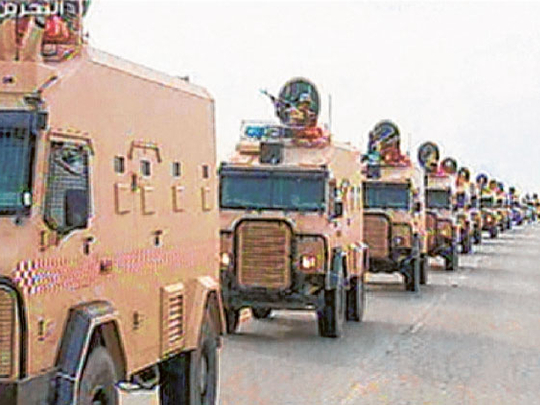
Manama: Bahrain state TV says a three-month state of emergency has been declared to try to quell political unrest threatening the monarchy.
The statement from the King of Bahrain, King Hamad Bin Eisa Al Khalifa, says that the nation's armed forces chief is authorised to take all measures to stamp out protests that have gripped the island nation for the past month.
A Saudi soldier was shot dead by opposition protester in Bahrain on Tuesday, a Saudi security official said. However Bahraini officials have denied the report.
Tuesday's move comes a day after GCC forces arrived to help prop up the US-backed regime.
Bahrain on Monday confirmed the arrival of military units from the Peninsula Shield “following regrettable events that undermined security and threatened citizens and residents”.
“The security and stability of the Gulf Cooperation Council [GCC] is a common responsibility, and this was reconfirmed by the GCC foreign ministers at their latest meeting,” a statement carried by Bahrain News Agency said.
The military force will help Bahraini authorities deal with the month-long unrest in the country.
Foreign Minister Shaikh Abdullah Bin Zayed Al Nahyan said the UAE has sent around 500 policemen to Bahrain. “The Bahrain government asked us yesterday [Monday] to look at ways to help them to defuse tension in Bahrain,” he told journalists when asked about the UAE decision to send security forces into the kingdom at a gathering of Group of Eight foreign ministers in Paris. He later went into talks with US Secretary of State Hillary Clinton.
Iran called the arrival of Saudi troops in Bahrain unacceptable on Tuesday and urged the island kingdom to respond to pro-democracy demonstrators peacefully and without foreign intervention.
"The presence of foreign forces and interference in Bahrain's internal affairs is unacceptable and will further complicate the issue," Foreign Ministry spokesman Ramin Mehmanparast said at his weekly news conference.
Earlier, WAM said the UAE is sending a force to Bahrain as part of the Peninsula Shield. Dr Anwar Mohammad Gargash, Minister of State for Foreign Affairs, said the move reflects the UAE’s commitment towards its brethren within the framework of the GCC bloc.
“The security and stability in the region requires all of us to stand united in one rank so as to safeguard our national gains and prevent any strife for a better future,” Dr Gargash said.
Authorities call for overcoming sectarian divide
Bahrain’s justice, Islamic affairs and endowments ministry has urged all Bahrainis to stand together in the face of dangers and challenges and preserve security and stability in the country.
“The people of Bahrain have always lived in peace and harmony and we are all responsible for the situation in which we are today,” the ministry said in a statement carried by Bahrain News Agency (BNA). “We are all responsible for every drop of blood or tear, for the anguish of scared girls and for every torn heart.”
All religious leaders should advise people everywhere and help narrow divergences and tackle the sectarianism eating at the social fabric of the nation, the ministry said.
The country this week appeared increasingly divided along sectarian faults and clashes erupted in several schools and at the University of Bahrain, prompting the formation of vigilante groups carrying sticks and swords to guard their neighbourhoods.
One man, Pakistani Abdul Malik, is believed to have been killed in an attack in Manama on Saturday evening.
According to a media report, Abdul Malik, 30, was on his way to buy food when he was fatally attacked at around 7.30pm.
Three Bangladeshi workers were also attacked in Manama. Ameer Hamza was assaulted near Adhari Hotel by youths armed with wooden planks and sticks. Two other Bangladeshi workers were stabbed as they tried to rescue Ameer.












